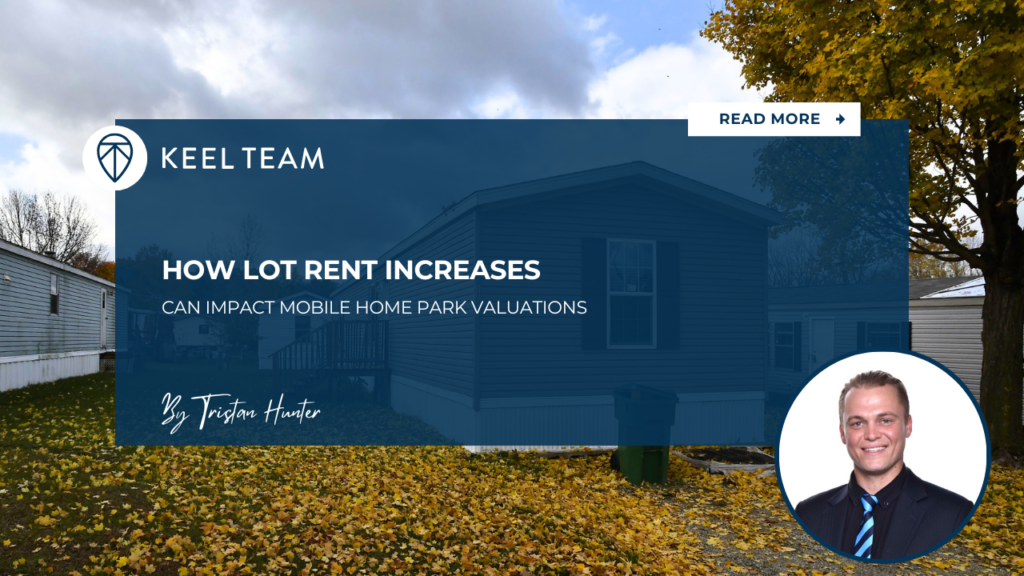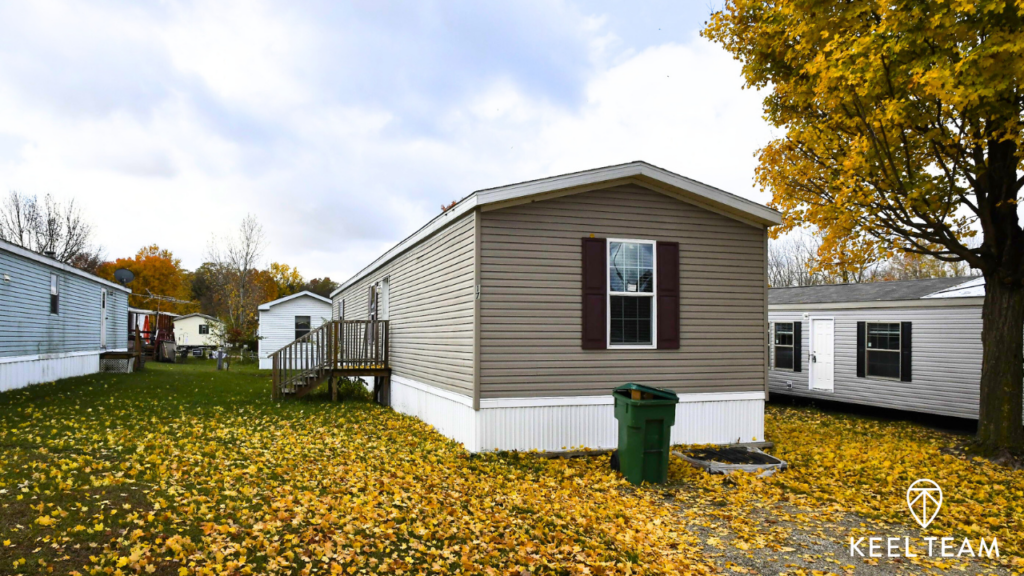How Lot Rent Increases Can Impact Mobile Home Park Valuations
-
 Tristan Hunter - Investor Relations
Tristan Hunter - Investor Relations

Investing in mobile home parks presents a unique opportunity to combine affordable housing solutions with long-term profitability. Among the many factors that influence the valuation of a mobile home park, lot rent increases play a significant role. Understanding how these adjustments impact the overall value of a mobile home park can provide crucial insights for investors looking to maximize return potential while maintaining community stability. This article will explore how lot rent increases affect mobile home park valuations, and why this aspect is pivotal in the overall strategy.
The Role of Lot Rent in Mobile Home Park Valuations
Lot rent refers to the fee that residents pay for leasing a plot of land within a mobile home park. In most cases, residents own their mobile homes but rent the land on which the home is situated. Lot rent typically includes access to essential utilities, maintenance of common areas, and other amenities.
For mobile home park owners, lot rent is the primary driver of revenue. Therefore, any increase in lot rent typically impacts the net operating income (NOI). Since valuations for mobile home parks are typically based on a multiple of NOI, even modest rent increases can significantly influence the overall valuation.
How Lot Rent Increases Influence Net Operating Income (NOI)
Net operating income (NOI) represents the total income generated by the mobile home park minus operating expenses. For investors, NOI serves as the foundation for determining the value of the property. When lot rents increase, the corresponding rise in NOI can boost the park’s valuation.
Example of a Lot Rent Increase Impacting Valuation
Suppose a mobile home park has 100 occupied lots with an average rent of $300 per month. A $25 per month rent increase generates an additional $2,500 in monthly revenue or $30,000 annually. Using a market cap rate of 7%, this increase in NOI could raise the property’s valuation by approximately $428,571.
Small rent increases, implemented carefully, can create significant value without placing undue financial pressure on residents.
Balancing Rent Increases and Community Retention
While raising lot rent can enhance the mobile home park’s valuation, owners should approach this carefully to avoid tenant dissatisfaction or turnover. Many mobile home park residents live on fixed incomes, so sudden or steep rent increases may lead to financial strain or higher vacancy rates.
Strategies to balance rent increases with resident satisfaction include:
- Incremental Adjustments: Opt for small, regular increases rather than infrequent but steep hikes. This approach feels more manageable for residents.
- Transparency: Clearly communicate the reasons for rent increases, such as rising maintenance costs or infrastructure improvements.
- Added Value: Pair rent increases with visible community upgrades, like improved landscaping, new amenities, or additional upgrades, to justify the adjustments.
Maintaining a stable, long-term tenant base is typically key to sustaining both cash flow and valuation growth over time.
Download our FREE eBook on the Top 20 things to know BEFORE investing in mobile home parks!
Why Lot Rent Increases Hold Greater Weight in Valuations
Lot rent, as opposed to income from park-owned homes (POHs), carries more weight in determining a mobile home park’s valuation. This preference stems from the fact that lot rent reflects stable, recurring income with lower management and maintenance responsibilities.
Predictability and Scalability of Lot Rent
Lot rent is less susceptible to fluctuations and economic downturns compared to POH income. Residents are unlikely to move their homes due to the high cost of relocation, likely ensuring a steady revenue stream. This stability makes lot rent an attractive and reliable component of NOI for investors and appraisers.
The Long-Term Impact of Rent Adjustments
Rent increases contribute directly to the property’s long-term value. Unlike other revenue sources, lot rent generates predictable, low-risk cash flow, making it a key metric in determining a mobile home park’s worth.
POH Income: Why It Typically Doesn’t Affect Valuation
While income from park-owned homes may boost cash flow, it does not usually contribute to the valuation of the mobile home park. Here’s why:
POH Income Is Not Viewed as Core Revenue
Park-owned homes are often considered an operational responsibility rather than a core aspect of the mobile home park’s business model. Managing and maintaining POHs requires additional expenses, such as repairs, turnover costs, and tenant management. These factors make POH income less predictable and less appealing to potential buyers.
Increased Risk with POHs
Unlike lot rent, which is relatively stable, POH income introduces additional risk. Vacancies, maintenance costs, and tenant turnover can erode profits. Valuation models often exclude or heavily discount POH income due to these uncertainties.
Market Perception
Investors and appraisers tend to view mobile home parks with minimal POHs as more attractive. Fewer POHs mean lower management overhead and less operational risk, which aligns with the appeal of owning land with steady lot rent income.
Focus on Lot Rent-Driven NOI
Since lot rent is the foundation for determining valuation, POH income rarely impacts the cap rate applied during appraisals. Even if POHs generate additional cash flow, appraisers prioritize the long-term, land-driven revenue model over short-term gains from owning homes.

The Benefits of Transitioning POHs to Tenant-Owned Homes (TOHs)
To enhance the valuation and reduce management overhead, many mobile home park owners aim to transition POHs into tenant-owned homes (TOHs). This process involves selling POHs to residents and converting them into long-term lot renters.
Advantages of Promoting TOH Ownership
- Reduced Maintenance Costs: Owners no longer bear the burden of repairs or upkeep.
- Stronger Tenant Retention: Homeowners are less likely to leave due to the high cost of moving their mobile homes.
- Simplified Operations: With fewer POHs, owners can focus on managing the land and infrastructure rather than individual homes.
Promoting TOH ownership aligns with the long-term investment strategy for many mobile home parks, potentially ensuring stable income and reducing risk.
A Strategic Approach to Lot Rent Increases
Strategic lot rent increases require a balance of financial goals and tenant needs. The following steps can help owners implement adjustments successfully:
- Research Market Rates: Compare lot rents with nearby communities to ensure your rates remain competitive.
- Monitor Occupancy Trends: Avoid increases if the property is experiencing high vacancy rates, as this may deter potential renters.
- Prioritize Communication: Engage with tenants early to explain the need for adjustments, focusing on improvements or rising operational costs.
By maintaining this balance, mobile home park owners can achieve higher valuations while preserving tenant satisfaction and long-term stability.
Conclusion: Lot Rent as a Valuation Driver
Lot rent increases play a pivotal role in driving mobile home park valuations, as they directly influence NOI and, by extension, the property’s overall worth. When implemented strategically, rent adjustments can yield significant financial benefits without sacrificing tenant retention.
On the other hand, income from park-owned homes, while beneficial for short-term cash flow, does not carry the same weight in valuations. Investors should prioritize strategies that enhance lot rent income, such as transitioning POHs to TOHs, to possibly ensure long-term growth and stability.
For mobile home park owners and investors, understanding the nuances of lot rent and its impact on valuations can be essential for building a potentially successful portfolio in this unique real estate sector.
Are you looking for MORE information? Book a 1-on-1 consultation with Andrew Keel to discuss:
- A mobile home park deal review
- Due diligence questions
- How to raise capital from investors
- Mistakes to avoid, and more!
Disclaimer:
The information provided is for informational purposes only and is not investment advice or a guarantee of any kind. We do not guarantee profitability. Make investment decisions based on your own research and consult registered financial and legal professionals. We are not registered financial or legal professionals and do not provide personalized investment recommendations.

Tristan Hunter - Investor Relations
View The Previous or Next Post
Subscribe Below 👇





